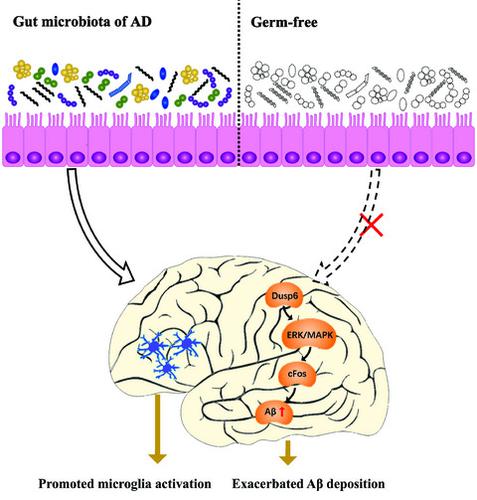当前位置:
X-MOL 学术
›
J. Neurochem.
›
论文详情
Our official English website, www.x-mol.net, welcomes your feedback! (Note: you will need to create a separate account there.)
Gut microbiota regulate cognitive deficits and amyloid deposition in a model of Alzheimer's disease.
Journal of Neurochemistry ( IF 4.7 ) Pub Date : 2020-04-22 , DOI: 10.1111/jnc.15031 Zhuo Li 1 , Hua Zhu 1 , Yaxi Guo 1 , Xiaopeng Du 1 , Chuan Qin 1
Journal of Neurochemistry ( IF 4.7 ) Pub Date : 2020-04-22 , DOI: 10.1111/jnc.15031 Zhuo Li 1 , Hua Zhu 1 , Yaxi Guo 1 , Xiaopeng Du 1 , Chuan Qin 1
Affiliation

|
Gut microbiota, comprising a vast number of microorganism species with complex metagenome, are known to be associated with Alzheimer's disease (AD) and amyloid deposition. However, studies related to gut microbiota have been mostly restricted to comparisons of amyloid deposits, while investigations on neurobehavioral changes and the pathogenesis of AD are limited. Therefore, we aimed to identify the relationship between changes in the intestinal microbiome and the pathogenesis of AD. APPswe/PS1ΔE9 (PAP) transgenic mice and wild‐type (WT) mice of different age groups were used. The composition of intestinal bacterial communities in the mice was determined by 16S ribosomal RNA sequencing (16S rRNA Seq), and the Y maze was used to measure cognitive function. Transcriptome sequencing (RNA Seq) and Gene Expression Omnibus (GEO) database (GSE 36980) were used to filter differentially expressed genes (DEGs) between specific pathogen‐free (SPF) and germ‐free (GF) mice. Quantitative reverse‐transcriptase PCR (qRT‐PCR) and western blot (WB) were used to verify the results. We found that the intestinal microbiota was significantly different between 5‐month‐old PAP and WT mice and the cognition of SPF PAP mice was diminished compared to GF PAP and SPF WT mice. DEGs in 5‐month‐old SPF and GF mice were enriched in the MAPK signalling pathway, and expression of amyloid precursor protein and amyloid deposition increased in 5‐month‐old SPF PAP mice. Results from this study showed that changes in intestinal microbiota were correlated with impairment of cognitive function and might promote amyloid deposition by stimulating the MAPK signalling pathway in the brain.
中文翻译:

肠道菌群可调节阿尔茨海默氏病模型中的认知缺陷和淀粉样蛋白沉积。
肠道菌群包括大量具有复杂的基因组的微生物,已知与阿尔茨海默氏病(AD)和淀粉样蛋白沉积有关。然而,与肠道菌群有关的研究主要限于淀粉样蛋白沉积物的比较,而有关神经行为变化和AD发病机制的研究却很有限。因此,我们旨在鉴定肠道微生物组变化与AD发病机制之间的关系。APP SWE / PS1 ΔE9使用(PAP)转基因小鼠和不同年龄组的野生型(WT)小鼠。通过16S核糖体RNA测序(16S rRNA Seq)确定小鼠肠道细菌群落的组成,并使用Y迷宫测量认知功能。转录组测序(RNA Seq)和基因表达综合(GEO)数据库(GSE 36980)用于过滤无病原体(SPF)和无病菌(GF)小鼠之间的差异表达基因(DEG)。定量逆转录酶PCR(qRT-PCR)和Western blot(WB)用于验证结果。我们发现5个月大的PAP和WT小鼠之间的肠道菌群存在显着差异,与GF PAP和SPF WT小鼠相比,SPF PAP小鼠的认知度降低。5个月大的SPF和GF小鼠的DEG富含MAPK信号通路,5个月大的SPF PAP小鼠的淀粉样蛋白前体蛋白表达和淀粉样蛋白沉积增加。这项研究的结果表明,肠道菌群的变化与认知功能受损有关,并可能通过刺激大脑中的MAPK信号通路来促进淀粉样蛋白沉积。
更新日期:2020-04-22
中文翻译:

肠道菌群可调节阿尔茨海默氏病模型中的认知缺陷和淀粉样蛋白沉积。
肠道菌群包括大量具有复杂的基因组的微生物,已知与阿尔茨海默氏病(AD)和淀粉样蛋白沉积有关。然而,与肠道菌群有关的研究主要限于淀粉样蛋白沉积物的比较,而有关神经行为变化和AD发病机制的研究却很有限。因此,我们旨在鉴定肠道微生物组变化与AD发病机制之间的关系。APP SWE / PS1 ΔE9使用(PAP)转基因小鼠和不同年龄组的野生型(WT)小鼠。通过16S核糖体RNA测序(16S rRNA Seq)确定小鼠肠道细菌群落的组成,并使用Y迷宫测量认知功能。转录组测序(RNA Seq)和基因表达综合(GEO)数据库(GSE 36980)用于过滤无病原体(SPF)和无病菌(GF)小鼠之间的差异表达基因(DEG)。定量逆转录酶PCR(qRT-PCR)和Western blot(WB)用于验证结果。我们发现5个月大的PAP和WT小鼠之间的肠道菌群存在显着差异,与GF PAP和SPF WT小鼠相比,SPF PAP小鼠的认知度降低。5个月大的SPF和GF小鼠的DEG富含MAPK信号通路,5个月大的SPF PAP小鼠的淀粉样蛋白前体蛋白表达和淀粉样蛋白沉积增加。这项研究的结果表明,肠道菌群的变化与认知功能受损有关,并可能通过刺激大脑中的MAPK信号通路来促进淀粉样蛋白沉积。


























 京公网安备 11010802027423号
京公网安备 11010802027423号